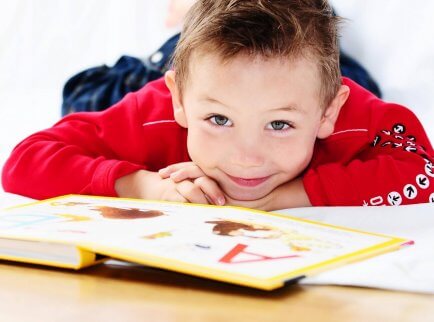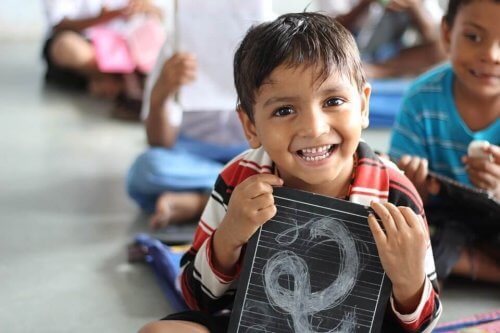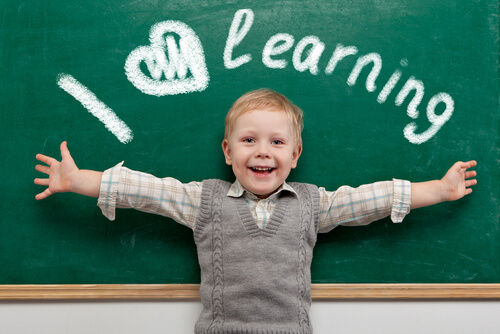Feeling of Self-Efficacy in Children: How to Develop It

Self-efficacy can be defined as a person’s determination and confidence to face different situations and accomplish goals. This quality allows children to integrate into social environments affectively.
Helping children gain and maintain a healthy sense of self-efficacy as they grow up is a big challenge for all parents.
Why Is Self-Efficacy in Children Important?
Albert Bandura, Canadian psychologist and huge supporter of this cognitive theory, affirms that self-efficacy helps people overcome problems quickly. In addition, it helps us develop interest and motivation to carry out common tasks.
The feeling of self-efficacy in children will help them build confidence. It also leads to thoughts and behaviors that will help them see the world in a positive way.
This feeling is reflected in family relationships, academic performance, and integration into society. Self-efficacy will also let kids learn to reduce stress in difficult or challenging situations.
Behavior of a Child with Developed Self-Efficacy
This quality is influenced by self-esteem. A child with high self-esteem builds self-efficacy and self-confidence. These children will also develop the following characteristics:
- They see difficulties as chances to learn.
- They feel motivated by their daily tasks, and are interested in every detail of their activities.
- The child recovers quickly from disappointments and setbacks.
- They feel committed to each hard situation.
- They see challenges as exciting, and feel happy when they overcome them.

Behavior of a Child Without Self-Efficacy
A child who doesn’t have a reasonable amount of self-efficacy can have the following attitudes:
- They cry in stressful situations. They strongly believe they can’t solve or endure them.
- Avoid difficult activities. They focus on previous failures and other negative aspects.
- It takes them time to learn to read, add subtract, and get used to the school environment.
- When they reach adolescence, they show signs of depression and isolate themselves.
“The feeling of self-efficacy in children will help them build confidence. It also leads to thoughts and behaviors that will help them see the world in a positive way.”
Recommendations to Encourage Self-Efficacy in Children
Self-efficacy in children is shaped during their first few years of life. To help the child develop this feeling and maintain it, you can follow these tips:
- Stimulate reflection after learning. To do this, ask guided questions that lead the child to realize what they need to learn and the tools they will use.
- Let them follow their own personal rhythm of learning. Every child is different. Their learning process will be different from their peers.
- Congratulate them and reinforce what they learned. Avoid making errors seem like limits on what they do. On the contrary, congratulate and reinforce the positive part of the activities they do.

- Teach children how to handle anger and frustration. Explain to them that making mistakes is completely normal.
- Listen to them carefully. They will develop self-efficacy when they feel like they’re being heard. They translate this action into feelings of love and worth.
- Teach them to make decisions and try new challenges. With this, you can foster independence and the ability to weigh benefits and risks.
- Express how you feel with words and show them that mistakes are a chance to learn. You can do this when you reflect positively on what happened, without placing blame, but also without leaving them out.
- Spark their motivation and interest. Help them understand and appreciate the tools they have to learn.
- Help them recognize and accept their emotions. Also, teach them to express them in a way that doesn’t hurt other people’s feelings.
All in all it’s possible to develop the feeling of self-efficacy in children. However, it’s something that definitely takes time. Take advantage of family outings, dinner time, games, and other opportunities that come your way. This will help you create positive experiences for their cognitive development.
All cited sources were thoroughly reviewed by our team to ensure their quality, reliability, currency, and validity. The bibliography of this article was considered reliable and of academic or scientific accuracy.
- Ortiz, M. Á. C., & del Barrio Gandara, M. V. (2002). Evaluación de la autoeficacia en niños y adolescentes. Psicothema, 14(2), 323-332. https://www.redalyc.org/pdf/727/72714221.pdf
- Canto, J. E. (2011). Autoeficacia y educación. Educación y ciencia (ISSN 2448-525X), 2(18). http://www.educacionyciencia.org/index.php/educacionyciencia/article/view/142
- Olaz, F. (1997). Autoeficacia, diferencias de género y comportamiento vocacional. Revista electrónica de Motivación y Emoción, 6(13), 86-92. https://www.researchgate.net/profile/Fabian_Olaz/publication/262676657_Autoeficacia_Diferencias_de_Genero_y_Comportamiento_Vocacional/links/0f31753868f3c19e64000000/Autoeficacia-Diferencias-de-Genero-y-Comportamiento-Vocacional.pdf
- Holden, G., Moncher, M. S., Schinke, S. P., & Barker, K. M. (1990). Self-efficacy of children and adolescents: A meta-analysis. Psychological Reports, 66(3), 1044-1046. https://journals.sagepub.com/doi/abs/10.2466/pr0.1990.66.3.1044